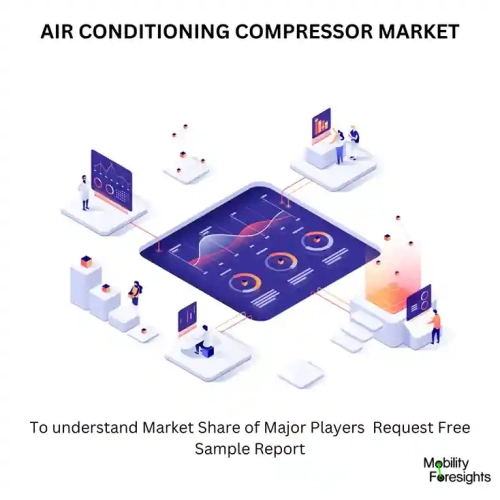
- Get in Touch with Us

Last Updated: Apr 25, 2025 | Study Period: 2024-2030
The Air Conditioning Compressor Market is driven by several key factors such as increasing demand for energy-efficient air conditioners, increasing manufacturing activities, and focus on environmental sustainability. The use of variable speed processors and environmentally friendly refrigerators are the key trends shaping the market. These technologies provide improved energy efficiency, performance, and sustainability, and meet key market requirements.
The market presents significant investment opportunities in the residential and commercial sectors. Increasing urbanization, increasing disposable income, and increasing demand for home comfort solutions drive the residential sector. The need for effective cooling solutions for large commercial spaces including offices, retail, and hospitality is driving the growth of the market.
However, the market faces challenges such as the high initial cost of energy-efficient compressors, compliance with various environmental and safety regulations, etc. These factors may restrict adoption, especially in the market and in the expensive. Despite these challenges, the market is poised for continued growth driven by technological advancements and growing demand for advanced cooling solutions.

The global air conditioning compressor market is expected to grow significantly during the forecast period driven by the increasing demand for energy-efficient air conditioning units and growing construction activity investment that provides necessary funding due to increasing urbanization and demand for home comfort solutions. Large commercial areas also provide practical opportunities for effective cooling solutions.
The air conditioning (AC) compressor is an integral part of the vehicle's climate control system, which is responsible for maintaining a comfortable interior temperature by circulating coolant throughout the system. It is blown as a gas and forced into a gas of high pressure and high temperature. This process initiates the cooling cycle, which ultimately cools the interior of the vehicle.
One of the primary functions of an AC compressor is to convert the low-pressure refrigerant air from the evaporator to a higher-pressure, higher temperature before it enters the condenser. This conversion is necessary to provide absorbed heat from the refrigerated room air. The high-pressure air inside the steam chamber cools and cools to a liquid, releasing absorbed heat to the outside. This cycle continues as the refrigerant passes through the expansion valve, where it takes a pressure drop and is converted back to lower air, absorbing heat from the flue gas in the evaporator hence, the operation of the compressor in the continuous refrigerant pressure and flow are critical to the effective and efficient operation of the system.
Modern automotive AC compressors have made great strides in terms of efficiency, durability, and control mechanisms. For example, Variable displacement compressors can adjust their pumping capacity based on coolant demand, thereby improving fuel efficiency and reducing engine load This adjustment is particularly useful in traffic conditions stop-and-go types, where coolant requirements can vary greatly. Additionally, the use of an advanced control system allows for precise programming of compressor operation, ensuring optimum performance and preventing issues such as compressor clutch failures or refrigerant leaks.
Maintenance and proper use of an AC compressor are critical to the longevity and efficiency of a vehicleâs climate control system. Constant control of coldness, insufficient affection, and internal decay can be prevented from failure without failure, and the worsening of these problems can be prevented from catastrophe. In summary, the AC compressor is key to maintaining a pleasant indoor environment, and advances in its technology continue to improve its efficiency and reliability.
| Sl no | Company | Product Description | Analyst View |
| 1 | Daikin | Inverter scroll compressor The Daikin inverter scroll compressor provides variable speed operation, providing improved energy efficiency and performance. The compressor adjusts its speed based on cooling requirements, reducing energy consumption and operating costs. | Daikinâs focus on variable-speed technologies meets key market requirements for energy-efficient and cost-effective air conditioning solutions, positioning the company as a market leader. |
| 2 | Mitsubishi Electric | Environmentally friendly rotary compressor Mitsubishi Electricâs environmentally friendly rotary compressor uses low GWP refrigerant, providing a sustainable and efficient cooling solution. The compressor is designed for both residential and commercial applications, providing high performance and reliability. | Mitsubishi Electric's adoption of environmentally friendly refrigerators highlights the industry's shift towards environmentally sustainable, compliant air conditioning solutions, internal pressures, and meeting customer preferences. |
| 3 | LG Electronics | Smart Inverter Compressor The smart inverter compressor from LG Electronics features IoT connectivity, and offers advanced power management, predictive maintenance, and user control. The compressor is designed to maximize cooling efficiency while reducing energy consumption. | LG Electronicsâ smart technologies integrated with inverter compressors meet the growing demand for advanced and connected air conditioning solutions, positioning the company as a market leader. |
| 4 | Panasonic | Solar-powered compressor Panasonic's solar-powered compressor combines with renewable energy sources, such as solar energy, providing a sustainable and energy-efficient cooling solution The compressor is designed for residential and commercial applications, reducing energy consumption function and carbon footprint. | Panasonic's focus on renewable energy integration is in line with global sustainability goals, offering innovative solutions that reduce energy consumption and resources. |
The competitive scenario of the air conditioning compressor market is characterized by the presence of several key players such as Daikin, Mitsubishi Electric, LG Electronics, Panasonic, etc. These companies focus on innovation, strategy, and expansion of their products to stay competitive.
Recent introductions have highlighted the trend towards variable speed, not environmentally friendly, intelligent air conditioners. For example, the environmentally friendly Daikin inverter scroll compressor and Mitsubishi Electric rotary compressor offer improved energy efficiency and sustainability LG Electronics intelligent inverter compressor and Panasonic compressor a solar-powered reflecting the industryâs shift towards advanced integrated wind turbines.
The market also witnesses collaboration between air conditioning manufacturers and suppliers of compressor technology to develop innovative and cost-effective solutions that meet market demands This collaboration aims to tackle key challenges to be addressed to accommodate advanced air conditioning.
| Sr.NO | Topic |
| 1 | Market Segmentation |
| 2 | Scope of the report |
| 3 | Research Methodology |
| 4 | Executive Summary |
| 5 | Average B2B by price |
| 6 | Introduction |
| 7 | Insights from Industry stakeholders |
| 8 | Key Drivers for Global Air Conditioning Compressor market |
| 9 | Disruptive Innovation in the Industry |
| 1011 | Overview of Global Air Conditioning Compressor MarketMajor impact on Technological advancements |
| 12 | Consumer trends in the industry |
| 13 | Recent technological trends in Global Air Conditioning Compressor Market |
| 14 | SWOT Analysis of Key Market Players |
| 15 | New product development in the past 12 months |
| 16 | Market Size, Dynamics, and Forecast by Geography , 2024-2030 |
| 17 | Market Size, Dynamics, and Forecast by Type , 2024-2030 |
| 18 | Market Size, Dynamics, and Forecast by Vehicle Type , 2024-2030 |
| 19 | Market Size, Dynamics, and Forecast by Application , 2024-2030 |
| 20 | Competitive landscape |
| 21 | Gross margin and average profitability of suppliers |
| 22 | Merger and Acquisition in the past 12 months |
| 23 | Growth strategy of leading players |
| 24 | Market share of vendors, 2023 |
| 25 | Market Company Profiles |
| 26 | Unmet needs and opportunities for new suppliers |
| 27 | Conclusion |